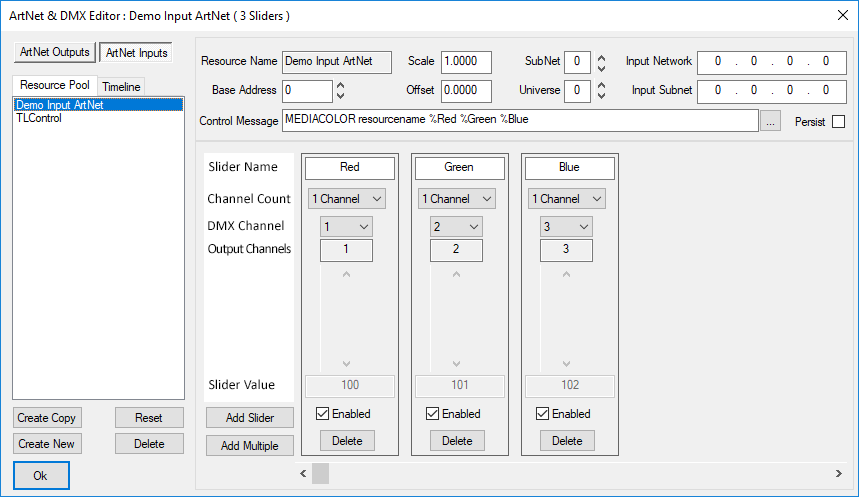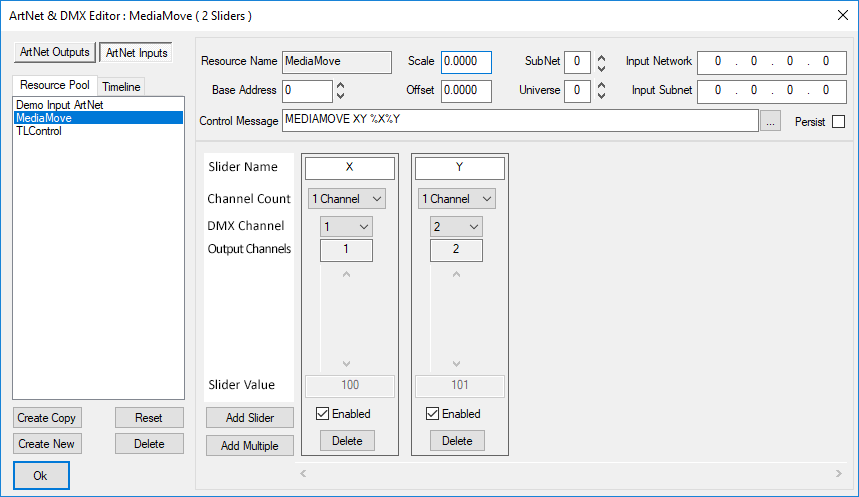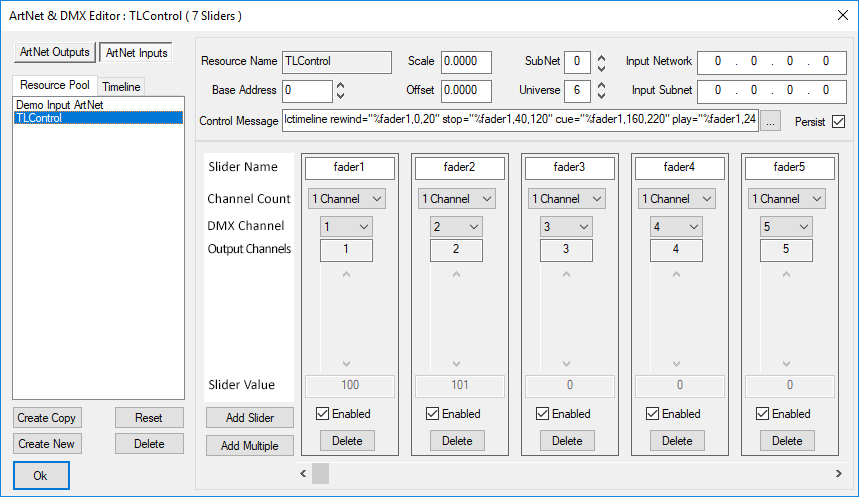This can be enabled separately from ArtNet output in the Config > Preferences > ArtNet and DMX page. To show Input resources in the ArtNet and DMX Editor, press the Show Inputs button, then you can select the pool or timeline input ArtNet resource from the list.
Shown below is an example ‘mediacolour’ input device where the device listens to channels 1,2 and 3, and if any changes in values within those channels are detected, sends an internal MEDIACOLOR command constructed from the Control Message and Slider Names as below.

In the next example, the Slider Names are X and Y, and the Control Message is MEDIAMOVE resourcename %X %Y, so in this case the %X string in the message is replaced with the value of the X Slider, %Y with the value of the Y Slider, so that that actual message sent internally is:
MEDIAMOVE resourcename 100 101
Which will change any visual resource with a name of ‘resourcename’ to 100 in X and 101 in Y.

Note that if the Control Message does not find the %Variable name in the Sliders, it will send that string directly, which may cause the command to fail. |
SubNet
0 – 15, these are separate ArtNet SubNets which can be listened to
Universe
0 – 15, these are separate ArtNet Universes which can be listened to
Persist
If enabled, this Input device will listen from the first frame on the timeline onwards (no end), if disabled, it will only listen if the timeline current frame is within the scope of this resource.
More Examples: Marker Selections
An input ArtNet resource is required to go to a marker depending on the value of ArtNet channel 1, so you add an Input ArtNet resource to the timeline at frame 0, set it to Persist, then have one slider with a name of ‘Name’, set to channel 1 and the control message is:
GOTOMARKER %Name
Now create markers on the timeline with Marker Name of ‘1’ and ‘2’ and place them on the timeline where you need, then when channel 1’s value changes from 0 to 1 to 2, gotomarker commands will be issued of GOTOMARKER 0, GOTOMARKER 1, GOTOMARKER 2 and since the marker exists for 1 and 2, these commands will succeed, where the value of 0 will do nothing, since there is no marker named ‘0’.
More Examples: Setting Global Variables
An Input ArtNet resource is required to set 3 global variables for use by a sequence, so you add an Input ArtNet resource to the timeline at frame 0, set it to Persist, then have three sliders with names of ‘Ch1’, ‘Ch2’ and ‘Ch3’ (set to channels 1, 2 and 3) with the control message:
globalvarset cmd=realtime $ch1=%Ch1 $ch2=%Ch2 $ch3=%Ch3
When any ArtNet values in channels 1, 2 or 3 change, the command is issued like this for values of 3, 45 and 88:
globalvarset cmd=realtime $ch1=3 $ch2=45 $ch3=88
This in turn sets (or creates and sets) $ch1, $ch2 and $ch3 variables to the values shown, which can be used within any sequence, for example to control media colour, position etc. The benefit of this is that the values can be manipulated in the sequence, for example offsetting or scaling them as required based on other inputs or variables.
The cmd=realtime is used to speed up this command, disabling logging so that for fast movement of channel values, the command is actioned as fast as possible.
More Examples: External Control LCTimeline
This Logic Control command is for real-time conditional actions based on an integer value. Example: play="75,50,100" will cause the timeline to play if 75 is between 50 and 100. This is most useful for ArtNet commands where 75 would be replaced with the value of an ArtNet input.
In the following example, actions have been assigned to a series of 7 named ArtNet/DMX faders (named variables %fader1, %fader2 etc.). The full LCTimeline control is:
lctimeline rewind="%fader1,0,20" stop="%fader1,40,120" cue="%fader1,160,220" play="%fader1,240,255" tl=1\r\n
lctimeline rewind="%fader2,0,20" stop="%fader2,40,120" cue="%fader2,160,220" play="%fader2,240,255" tl=2\r\n
lctimeline rewind="%fader3,0,20" stop="%fader3,40,120" cue="%fader3,160,220" play="%fader3,240,255" tl=3\r\n
lctimeline rewind="%fader4,0,20" stop="%fader4,40,120" cue="%fader4,160,220" play="%fader4,240,255" tl=4\r\n
lctimeline rewind="%fader5,0,20" stop="%fader5,40,120" cue="%fader5,160,220" play="%fader5,240,255" tl=5\r\n
lctimeline rewind="%fader6,0,20" stop="%fader6,40,120" cue="%fader6,160,220" play="%fader6,240,255" tl=6\r\n
lctimeline rewind="%fader7,0,20" stop="%fader7,40,120" cue="%fader7,160,220" play="%fader7,240,255" tl=7
